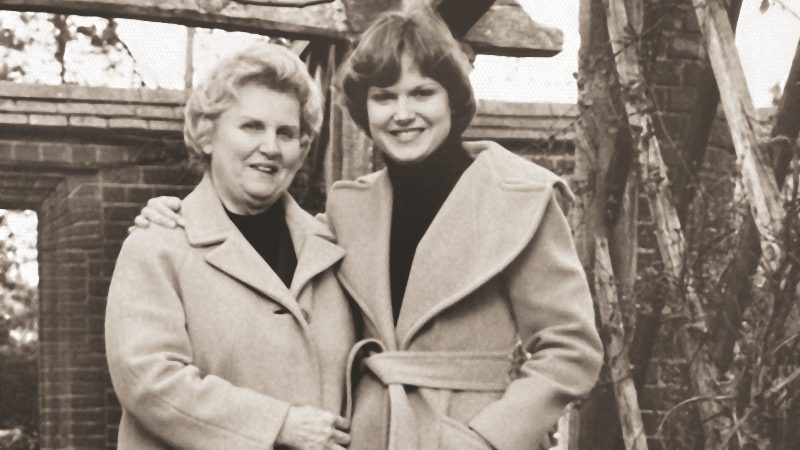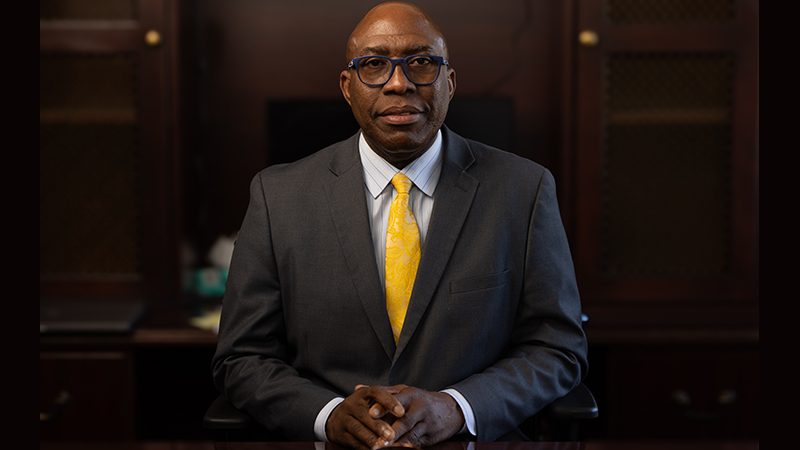Ronald Numbers, a leading American scholar in the history of religion and science whose 1976 book Prophetess of Health challenged the Seventh-day Adventist Church’s belief in Ellen G. White’s work, died on July 24. He was 81. A great raconteur who uniquely contributed to the upper echelons of both religion and science historiography, he served as a president of both the American Society of Church History and the History of Science Society.
The son of an Adventist pastor and the grandson of a General Conference president, Numbers was raised in the church and attended Adventist schools. After completing a degree in mathematics and physics at Southern Missionary College (now Southern Adventist University) in 1963, he began a master’s in history at Florida State University. It was there that he discovered his love for the history of science. “It became apparent that respectable historians of science could study science and religion,” he said in an interview. “I had been raised and educated in a very conservative religious environment and I thought, ‘Oh, this would be fantastic.’” Numbers decided he liked the “feel” of the area of study so much that went on to obtain his doctorate in the history of science at the University of California, Berkeley, in 1969.1

If you google images of Ronald Numbers, you’ll find a collection of photos of a jolly, round-faced man with glasses, smiling at the camera.
“He was fun to be around and was very well-liked,” recalled Jon Butler, church historian and friend of Numbers for over 50 years. “He was witty and could be sarcastic, but always playfully so.”
This social side of Numbers was in direct response to the isolating nature of his work. During his lifetime he wrote several books and edited countless others, perhaps his most notable being Prophetess of Health, a controversial book examining the life and work of Ellen White, in which Numbers posited that she was neither infallible nor entirely original. The resulting tumult fundamentally altered his relationship with the Adventist faith.
“Ron was a very plain-spoken, direct person who prized honesty and authenticity,” said Eric Anderson, emeritus professor of history at Pacific Union College. “He maintained many connections and friendships within the church throughout his life.”
Numbers was involved heavily with the Association of Adventist Forums, engaged often with other Adventist historians, and was one of the key promoters of the journal Adventist Heritage. He remained a member of Loma Linda University Church until his death.
“Though his Sabbath mornings after 1974 were not usually devoted to worship—he called himself an agnostic—he was, in a sense, a promoter of Adventism all his life,” Anderson wrote in a life sketch for Numbers’ memorial service. “Unlike many other lapsed Adventists, he did not engage in a jihad against his former beliefs, nor seek to suppress his religious roots.”
His academic drive was constant. “Ron never turned off the motor,” Butler said. “He was always thinking.”
Mentoring was very important to Numbers. He looked for ways to open doors for others, “suggesting promising research topics and making strategic introductions,” said Anderson. Fellow writers would send him pieces they were working on for feedback, and Numbers always made time for them.
“He had a way of encouraging and inspiring his friends and colleagues,” said Anderson. “Many people, myself included, can point to something they’ve done and say it only happened because Ron encouraged them to do it.”
Though his scholarly achievements were many, including receiving the George Sarton Medal—the most prestigious award given by the History of Science Society—Anderson said that perhaps the single most important thing Numbers did was challenge the idea that religion and science are automatically at war with each other. “His work and that of his students present a much more nuanced picture than that,” Anderson added.
“We don’t honor people because they are perfect,” Anderson said, offering historical examples such as Thomas Jefferson and Martin Luther. “Likewise, we don’t have to agree with everything Ron said, but we’ve certainly learned from him.”
____________________
By Becky St. Clair
1. Alex Aamodt, Alexander Carpenter, and Isabella Koh, “Ronald Numbers, Historian of Science and Ellen White, Dies at 81,” Spectrum (July 25, 2023), https://spectrummagazine.org/news/2023/ronald-numbers-historian-science-and-ellen-white-dies-81.
Recordando a Ron Numbers: mentor, erudito, disidente
Ron Numbers, destacado erudito estadounidense en la historia de la religión y la ciencia, cuyo libro de 1976 Prophetess of Health desafió la creencia de la Iglesia Adventista del Séptimo Día sobre la obra de Ellen G. White, murió el 24 de julio. Tenía 81 años. Un gran narrador que contribuyó de manera partocular a los escalones superiores de la historiografía religiosa y científica, se desempeñó como presidente de la Sociedad Americana de Historia de la Iglesia y de la Sociedad de Historia de la Ciencia.
Hijo de un pastor adventista y nieto de un presidente de la Conferencia General, Numbers fue criado en la iglesia y asistió a escuelas adventistas. Después de completar una licenciatura en matemáticas y física en Southern Missionary College (ahora Southern Adventist University) en 1963, comenzó una maestría en historia en la Florida State University. Fue ahí donde descubrió su amor por la historia de la ciencia. «Se hizo evidente que los historiadores respetables de la ciencia podían estudiar la ciencia y la religión», dijo en una entrevista. «Había sido criado y educado en un ambiente religioso muy conservador y pensé: “Oh, eso sería fantástico”». Numbers decidió que le gustaba tanto la «sensación» del área de estudio que obtuvo su doctorado en historia de la ciencia en University of California, Berkeley, en 1969.1

Si buscas en Google imágenes de Ronald Numbers, encontrarás una colección de fotos de un hombre alegre, de cara redonda y con gafas, sonriendo a la cámara.
«Era divertido estar cerca de él y era muy estimado», recordó Jon Butler, historiador de la iglesia y amigo de Números durante más de 50 años. «Era ingenioso y podía ser sarcástico, pero siempre juguetón».
Ese lado social de Numbers fue una respuesta directa a la aislante naturaleza de su trabajo. A lo largo de su vida escribió varios libros y editó muchos otros, siendo quizás el más notable Profetisa de la Salud, un libro controvertido que examina la vida y obra de Ellen White, en el que Numbers postula que no era infalible ni completamente original. El tumulto resultante alteró fundamentalmente su relación con la iglesia adventista.
«Ron era una persona muy directa y franca que valoraba la honestidad y la autenticidad», dijo Eric Anderson, profesor emérito de historia en Pacific Union College. «Mantuvo muchas conexiones y amistades dentro de la iglesia a lo largo de su vida».
Numbers estuvo muy involucrado con la Asociación de Foros Adventistas, a menudo se relacionó con otros historiadores adventistas y fue uno de los principales promotores de la revista Adventist Heritage. Siguió siendo miembro de la Iglesia de Loma Linda University hasta su muerte.
«Aunque sus sábados por la mañana después de 1974 no solían dedicarse a la adoración —se llamaba a sí mismo agnóstico—, fue, en cierto sentido, un promotor del adventismo toda su vida», escribió Anderson en un bosquejo de su vida para el servicio conmemorativo de Numbers. «A diferencia de muchos otros adventistas no practicantes, él no se involucró en una yihad contra sus antiguas creencias, ni buscó suprimir sus raíces religiosas».
Su impulso acdémico fue constante. «Ron nunca apagaba el motor», dijo Butler. «Siempre estaba pensando».
La tutoría era muy importante para Numbers. Buscó formas de abrir puertas para otros, «sugiriendo temas de investigación prometedores y haciendo introducciones estratégicas», dijo Anderson. Sus compañeros escritores le enviaban piezas en las que estaban trabajando para que les diese su opinión, y Numbers siempre les dedicaba tiempo.
«Tenía el don de animar e inspirar a sus amigos y colegas», dijo Anderson. «Mucha gente, incluyéndome a mí, puedo señalar algo que han hecho y decir que solo sucedió porque Ron los animó a hacerlo».
Aunque sus logros académicos fueron muchos, incluyendo la Medalla George Sarton, el premio más prestigioso otorgado por la Sociedad de Historia de la Ciencia, Anderson dijo que tal vez lo más importante que hizo Numbers fue desafiar la idea de que la religión y la ciencia están automáticamente en guerra entre sí. «Su trabajo y el de sus estudiantes presentan una imagen mucho más matizada que eso», agregó Anderson.
«No honramos a las personas porque son perfectas», dijo Anderson, ofreciendo ejemplos históricos como Thomas Jefferson y Martín Lutero. «Del mismo modo, no tenemos que estar de acuerdo con todo lo que dijo Ron, pero ciertamente hemos aprendido de él».
____________________
Por Becky St. Clair
1 Alex Aamodt, Alexander Carpenter, y Isabella Koh, “Ronald Numbers, Historian of Science and Ellen White, Dies at 81,” Spectrum (July 25, 2023), https://spectrummagazine.org/news/2023/ronald-numbers-historian-science-and-ellen-white-dies-81.






